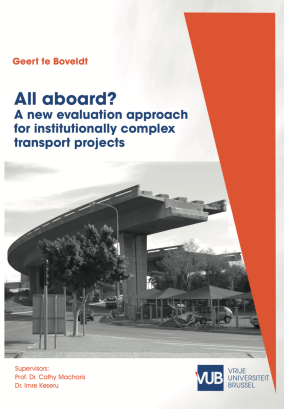
The intricate Belgian institutional structure, including multiple governments and institutional levels, is often cited as the cause for the slow progress or even the failure of transport projects. For the systematic consideration of the many advantages and disadvantages for society, economy and environment, transport planners typically recur to decision-supporting evaluation methods, such as (social) cost-benefit analysis (CBA) and multi-criteria analysis (MCA). Since the aim of these methods is to help decision makers cope with complex problems, they have significant potential for streamlining institutionally complex projects. In the field of evaluation, however, there is no clarity on how to deal with institutional complexity. Moreover, there is no consensus whatsoever on the aptness of different methods for measuring the ‘desirability’ of projects for society.
The objective of this thesis is therefore to develop a new evaluation approach for institutionally complex transport projects. The method consists of two key parts: on the one hand a literature- based study of the theoretical challenges on which to build the new approach, and on the other hand a test of the approach in three Belgian transport projects.
We analyse the theoretical challenges on macro, meso and micro level. At macro level we study the difficulty of determining desirability and feasibility, bearing in mind the unequal distribution of costs and benefits of each transport project over space, societal groups, and respective decision makers, whose interests need to be traded off. Instead of capturing societal utility in a single indicator, we argue for making these trade-offs explicit. At meso level we examine the role of evaluation within the planning process, typically aiming to recommend to either select or discard decision alternatives. As we argue that this method does not suit the evolutionary character of complex projects, we plead for an approach that provides meaningful input for the iterative adjustment of alternatives. Finally, at micro level, we assess the technical and mathematical appropriacy of the many existing evaluation techniques.
The proposed approach consists of two components which are also applicable individually. The first component, competence-based multi-criteria analysis, is a framework for the comparison of the desirability of alternatives for relevant societal groups and decision makers, structuring the involvement of stakeholders representing different societal domains and institutional levels. The second component, non-compensatory non-relative multi-criteria analysis, is a technique that contrarily to existing MCA methods does not result in a ranking of alternatives, but in an overview of their positive and negative impacts in order to identify disproportionately affected groups or decision makers.
We test the approach in three projects: the possible construction of a new railway tunnel in Brussels, the possible demolition of Brussels longest motorway viaduct and the reform of the Belgian company car regime. Here we notice that the participatory aspect does not only present solutions, but also challenges, such as the reticence to contribute due to political sensitivity. Even though the approach is based on the individual contributions of stakeholders, we identify the importance of close guidance to ensure the consistence of the evaluation. A remarkable result is that the alternatives that were initially favoured by the problem owners perform relatively low for the other stakeholders. We conclude that the approach can provide a valuable contribution to an integrated planning and evaluation process that takes the spatial, societal and political complexity of transport projects into account.
